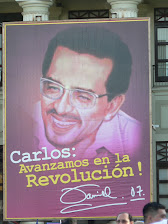The AVSN has close collaborators stationed in Venezuela year round. Their alert, below, should be taken seriously and soberly. They know what they are talking about, and do not depend on US controlled wire services for their information or analysis.
Felipe Stuart
Managua
Statement by the Australia Venezuela Solidarity Network
http://www.venezuelasolidarity.org/?q=node/2266
Oppose the US war plans for Colombia and Venezuela
On February 12, Colombia’s Senator Piedad Cordoba announced the suspension of the rescue operation of three Colombian parliamentarians who were to be liberated by the Revolutionary Armed Forces of Colombia (FARC). The operation was suspended due to bombings by the Colombian military that put the lives of the prisoners at risk. The operation would have represented the second unilateral step by the FARC towards attempting to reach a humanitarian accord, following the earlier release of two prisoners in January.
On February 12, Colombia’s Senator Piedad Cordoba announced the suspension of the rescue operation of three Colombian parliamentarians who were to be liberated by the Revolutionary Armed Forces of Colombia (FARC). The operation was suspended due to bombings by the Colombian military that put the lives of the prisoners at risk. The operation would have represented the second unilateral step by the FARC towards attempting to reach a humanitarian accord, following the earlier release of two prisoners in January.
These moves have occurred within the framework of the mediation process led by Venezuelan President Hugo Chavez, agreed to by Colombian President Alvaro Uribe in August then suspended by him in November. The previous rescue operation was also suspended when the Colombian military bombarded the area designated to release the prisoners.
The new round of bombing by the Colombian military is a stark reminder of the war policies of the Uribe government - backed by the United States administration – which aim to keep Colombia in a permanent state of war.
The desire of the majority of Colombian people, particularly the family members of FARC prisoners, is for a negotiated political settlement. A statement recently issued by numerous Colombian organisations and individuals, including the Colombian Association of Family Members of Detained and Liberated by the Guerrilla Groups, explains:
“After more than forty years of uninterrupted armed conflict, there is an urgent need to find viable paths that allow us to advance, without any more hold-ups or delays, towards a negotiated political solution of the armed conflict, where the rights of the victims are preserved. We reiterate out conviction that the war that Colombia is suffering can only be overcome via a broad, pluralist and concerted national dialogue with society.”
The mediation process head by Venezuela’s president began to open such a path, before it was terminated by the Uribe government. Chavez has continued to offer to play any role he can in facilitating an end to Colombia’s decades-long civil war, which has often spilt over into Venezuela territory.
The reason why Uribe stopped the process is clear: Washington fears a political solution to the Colombia’s war, which provides a pretext for the militarization of the region through Plan Colombia and now Plan Patriot. Any moves towards peace put into question the role of the US and its policy of violence and conflict, which has achieved worse than nothing.
Playing on the sentiments of the Colombian people for peace, the Uribe government and its allies promoted demonstrations against the FARC on February 4. These demonstrations, despite the intentions of many who participated, aimed to build support for increased military attacks on the FARC guerrillas. No mention was made at the rallies of the 15,000 Colombians who have disappeared at the hands of the Colombian military and paramilitaries, or the more than 3000 mass graves, or the more than 3500 massacres committed by the paramilitaries between 1982 and 2005, or the 16 extrajudicial executions committed by the military in January 2008 alone.
The demonstrations were also used to attack Chavez, accusing him of supporting terrorism and narco-trafficking. These false accusations are in line with recent statements by the US government and are part of a destabilisation campaign to spread the war across the border into Venezuela.
Venezuela represents a powerful brake on Washington’s war plans for the region. Chavez’s policy of promoting regional economic, political and cultural integration is helping to unite a continent-wide rebellion against US-imposed neoliberalism. Chavez’s call for peace in Colombia is a direct threat to the US policy of pursuing violence across Latin America to get rid of leftwing governments that oppose US domination and exploitation.
Unable to rely on political means to push back the Venezuelan revolution, the US is building up its war drive against Venezuela, for which its links to the Colombian paramilitaries are crucial. Just like the US propaganda and lies about “weapons of mass destruction” in the lead up to its war on Iraq, today Washington is talking about Venezuela as a “drug haven” that is “arming terrorists” and is a “threat to stability”.
That is why the Venezuelan government is completely correct when it says “there cannot be peace in Venezuela without peace in Colombia”. It is also why Chavez’s efforts to meditate a peaceful solution must be supported by all those who oppose war.
Calling for a global demonstration on March 6 “For the disappeared, for the misplaced, for the massacred, for the executed”, the National Movement of Victims of State Crimes (Colombia) asks those who participated in the anti-FARC demonstrations: “You marched on February 4. Will you accompany the victims of the paramilitaries, the para-politicians and state agents on March 6?”
The Australia-Venezuela Solidarity Network supports the March 6 demonstrations. We support the peace process led by President Hugo Chavez. We say: US hands of Colombia! US hands off Venezuela! US out of Latin America!
February 14, 2008
[For information about March 8 protest actions in Australia, visit www.venezuelasolidarity.org]



No comments:
Post a Comment